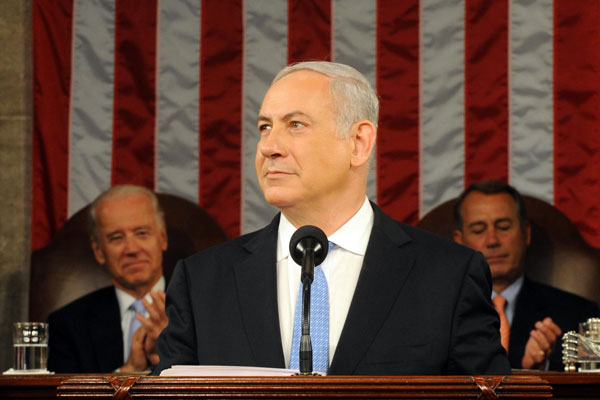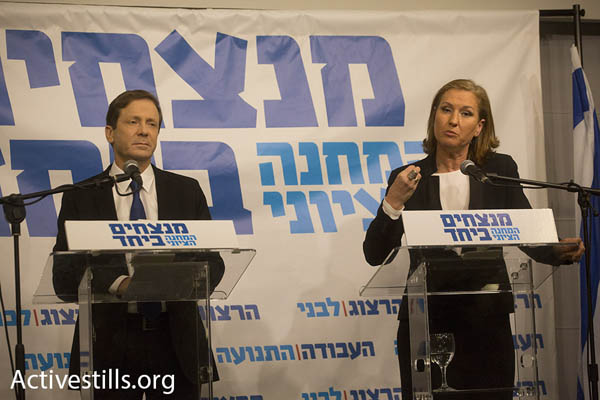Both Netanyahu and Livni are leveraging their international influence for electoral gain: Netanyahu in Congress and Livni at the United Nations. And, will the real Zionist camp please stand up?

Elections are almost always referendums on the incumbent, and an incumbent always has an advantage against any challengers. One of those advantages is the ability to demonstrate leadership and to exploit platforms unavailable to his or her challengers, i.e. speaking before a joint session of Congress.
Such advantages tend not to be fair, or even legal in some cases. In Israel, for instance, there are laws that prevent public servants from using their official platforms to campaign. The most famous case was during Ariel Sharon’s 2003 campaign when the Central Elections Committee instructed Israeli media to cut away from a live speech by the prime minister because it was political, they said. Prime time television news literally cut away from Sharon mid-sentence.
Seven years earlier, when then-opposition leader Benjamin Netanyahu was running against incumbent Prime Minister Shimon Peres, Netanyahu accused the latter, who was on a pre-election trip to the United States, of using the visit and his diplomatic ties for electoral gain.
“I can’t find an example of any previous Israeli government whose prime minister, on the eve of elections, made a cynical attempt to use relations between Israel and the United States as a party advertisement,” Netanyahu said at the time.
Fast-forward to 2015 and the tables are turned. This time, Netanyahu accepted an invitation to speak before a joint session of Congress just weeks before general elections in Israel. The criticism is two-fold. Firstly, that the Israeli prime minister is using the platform to augment the perception of his influence over the Republican party in Washington and to “move the Americans,” as he once described his ability to shape U.S. policy. Secondly, some are accusing Republican Speaker of the House Boehner of interfering in Israeli elections by giving him that stage — behind the back of the Obama administration, which claims it is staying out of internal Israeli politics.
But it turns out you don’t even need to be in office to flout international clout during election season, and White House support for an Israeli candidate doesn’t always come through official channels.
Just a few weeks after former Justice Minister and chief peace negotiator Tzipi Livni was fired from her post and new elections were called, the White House’s favorite advocate of the peace process was given an indirect endorsement by a top administration official.
U.S. Secretary of State John Kerry told a closed — but expectedly porous — room full of ambassadors that he had consulted with Livni about the Palestinian UN Security Council resolution on the agenda at the time. Kerry said that Livni told him the UN resolution would strengthen Netanyahu, her political opponent — at least one reason why Washington and European states should oppose it.
There are a lot of smart people working in the State Department, and diplomats choose their words — and audiences — very carefully. There should be little doubt that by telling dozens of people about his private consultations with Livni, and by relaying what she felt could hurt her chances of toppling Netanyahu, that Secretary Kerry was indirectly endorsing her, or at the very least publicly implying the White House’s preference that Netanyahu not serve a fourth term.
But more importantly, Kerry’s leaked remarks allowed Livni to flout her own influence over the White House back home — a counter-balance of sorts to Netanyahu’s shoe-in with the Republican-controlled Congress.
In a party statement, Livni all but took credit for convincing the Western world to support Israel in the United Nations. “[Livni is] proud that she successfully protected Israel’s essential interests in the Security Council,” said a statement from Livni’s new joint election slate with the Labor party, ambitiously named “The Zionist Camp.”
‘The [anti?] Zionist Camp’

Tzipi Livni’s “Hatnuah” party joined forces with the Labor party last month in an attempt to form a political bloc large enough to unseat Netanyahu. (There is talk of Yair Lapid joining the Livni-Labor bloc if Netanyahu joins together with Naftali Bennett.) The name of the new list, “The Zionist Camp,” is an attempt by the traditionally left-leaning Labor and two-state-principled “Hatnuah” to escape the “leftist” label, which has become a huge liability in Israeli politics in recent years.
The move to the center is likely to drive leftist voters to further-left parties like Meretz, which have a much less apologetic tone for the legacy of their politics. On the other side of the political map, however, it is coming under fire for appropriating the word “Zionist,” which in recent years has lost most of its traditional meaning. Instead it has become a catch-all term for blind patriotism, support for the right-wing politics that have perpetuated the occupation, and the supremacy of Jewish identity over a civic, more inclusive and egalitarian Israeli identity.
Ronen Shoval, a candidate for Naftali Bennett’s Jewish Home party went so far as to file an official complaint with the Central Elections Committee seeking to stop Livni and Labor from running under their chosen name, claiming it is misleading. They are not Zionists, he says.
It would be appropriate at this time to bring up a court case that involved Shoval two years ago when the hyper-nationalist organization he founded, Im Tirzu, which has also attempted to reclaim the word Zionist, sued for defamation after being called a fascist movement. They lost. The judge ruled that Im Tirzu does, in fact, bear similarities to fascist ideology.
Netanyahu joined the Zionist-bashing party on Thursday, putting out a video statement in which he quips that The Zionist Camp is actually the Anti-Zionist Camp. Why? “When a future member of the Knesset from the Labor list praises a Hezbollah agent, what more is there to say?”
Well, there’s quite a bit more to say, it turns out. From analyst Mitchell Plitnick:
Bibi is referring to testimony given by Zuhair Bahloul, a Palestinian citizen of Israel who is #17 on the joint Labor/Hatnuah list, dubbed “The Zionist Camp.” Bahloul is a well-known figure in Israel, a soccer and basketball broadcaster for Israel’s Channel 1. He is also known for his efforts in bringing Jewish and Arab citizens of Israel together to promote co-existence and equality, which has generally been the sum total of his political activity.
In this case, Bahloul was testifying on behalf of the family of a man who was convicted of aiding a Hezbollah plot to attack Shimon Peres in Turkey. The man, Milad Khatib, accepted a plea bargain and is serving a seven-year sentence. Bahloul’s testimony was offered in defense of Khatib’s family, not Milad himself…
In fact, Bahloul went out of his way to differentiate between Milad and the rest of his family: “When I heard what this young man did I was shocked,” he said, and he stressed that whatever made Milad “fall off the right path, it was not the family that brought him to this. It is not at all typical of this family.”
Related:
Ahead of close elections, Congress gives Bibi a prime-time appearance
Is the ICC running against Netanyahu in Israeli elections?
Israel’s elections: A referendum on Netanyahu



